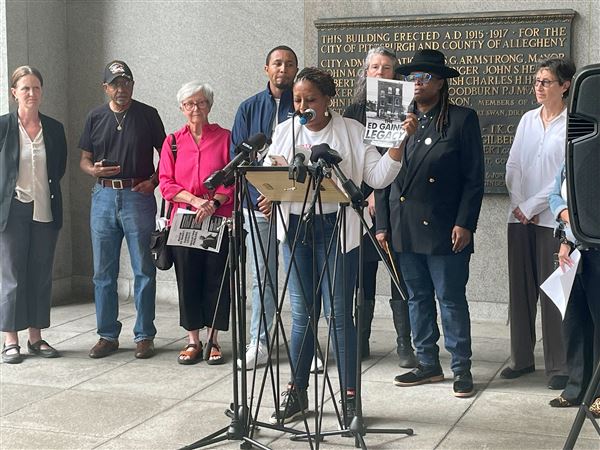When Susan Evans discovered her foot was swollen in December 2011, ovarian cancer never crossed her mind.
“I thought it was sprained — I couldn’t figure out what I did to it,” the retired English teacher said.
Understandably so: a swollen ankle isn’t usually included on a list of symptoms for ovarian cancer. But a lot of symptoms with ovarian cancer are difficult to detect, which is one of the underlying problems of the disease.
Mrs. Evans, now 65, first visited her doctor in Bradford in McKean County, who told her it was a back problem and recommended a shoe insert. When the insert didn’t alleviate her foot problem, she was finally referred to a chiropractor.
“She is a friend of mine, and when she looked at my foot, she said, ‘Susan, this isn’t a back problem, you need to get to the hospital,’ ” Mrs. Evans said. There it was discovered she had a potentially life-threatening blood clot.
It was also when doctors discovered an ovarian tumor. And it was June 2012 — six months after she first went to the doctor with a swollen foot.
After the doctor at the hospital told Mrs. Evans and her husband, George, she had a 25-pound tumor, the two were a bit “shell-shocked.” Mrs. Evans said her doctor also told them that she probably had just six months to live.
“We just couldn’t believe it. When they told me they were going to send me to a hospital in Buffalo, I told them, ‘No, I want to go to Magee,’ ” she said, referring to Magee-Womens Hospital of UPMC in Oakland.
Mrs. Evans and her husband have season tickets to the Pittsburgh Steelers and also own a home in Cranberry so that they can be closer to the games. Knowing that cancer treatment might be long and drawn out, she wanted to be close to the hospital, and her Cranberry home was close to Pittsburgh.
“It was when I started making decisions about my own health care,” she said.
The couple had to wait a day and a half for the ambulance that would take her to the hospital, time they spent at their local hospital, worrying. Once she got to Magee, they soon received good news. The tumor was 2.5 pounds.
“The doctor somehow missed the decimal point,” she said.
And then even better news.
“Dr. Krivak told me that it was definitely treatable,” Mrs. Evans said.
Mrs. Evans was referring to Thomas Krivak, a gynecologic oncologist who was on call when she came to the hospital.
Under Dr. Krivak’s care, Mrs. Evans had surgery and then underwent chemotherapy. After that round of treatment, she opted to have 15 more treatments with the drug Avastin, considered a type of preventive chemotherapy.
“It was another choice I made. I didn’t have to have the Avastin, but I decided I wanted to,” she said. Today, Mrs. Evans is in remission.
Mrs. Evan story doesn’t end there. Her story became, well, a story. She and Dr. Krivak went on to collaborate on a new self-published book, “Don’t Write the Obituary Yet.”
“I wanted to share my story with others facing the same scenario,” she said. “I want them to feel uplifted and to think, ‘Hey, I can get through it.’ ”
Mrs. Evans recounts her own journey with ovarian cancer through the book, including the mistakes the medical professionals made along the way. She doesn’t want to focus on the errors, just let others know that it is OK to ask questions, seek additional opinions and to explore options.
“You can make a choice, just like I chose to go to Pittsburgh,” Mrs. Evans said. “Sure, you may be lying in that hospital bed in a gown with your butt hanging out, but that doesn’t mean you don’t have a choice.”
Dr. Krivak and Mrs. Evans would meet at Starbucks on Saturdays, where he would read over chapters that she had written during the week.
“It is really her book,” he said. “I would read it over and make sure the medical information and terms were correct.”
Soon after Mrs. Evans’ bout with the disease, Dr. Krivak moved to Allegheny Health Network. The two, along with Mr. Evans, decided to form the Evans-Krivak Gynecological Cancer Research Fund, with all of the profits and proceeds from the book going toward the fund.
Housed under the umbrella of The Pittsburgh Foundation, the fund has two missions. “We want to help with the care and treatment of other women facing ovarian and other gynecologic cancers, but to also help fund research and education of doctors working with these patients,” she said.
Mr. and Mrs. Evans created the fund also, in part, to honor Dr. Krivak.
“It is said when someone saves someone’s life, the right thing to do is to honor that gift with another gift,” she said.
Although Dr. Krivak played down his role, he said, “This book may make someone see that someone else has been through this and maybe they wouldn’t feel so all alone facing this cancer.”
For more information about the Evans-Krivak Gynecological Cancer Research Fund, visit www.pittsburghfoundation.org/node/27384.
First Published: August 5, 2014, 4:00 a.m.
















